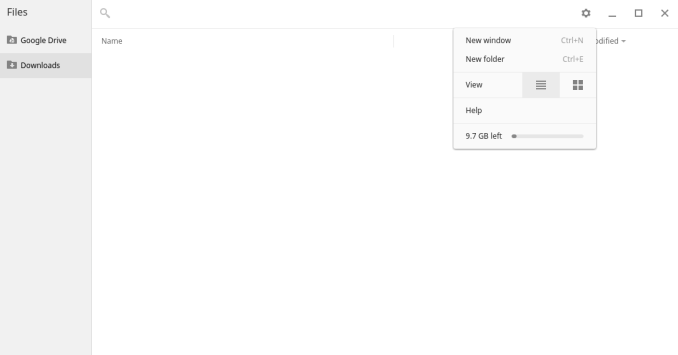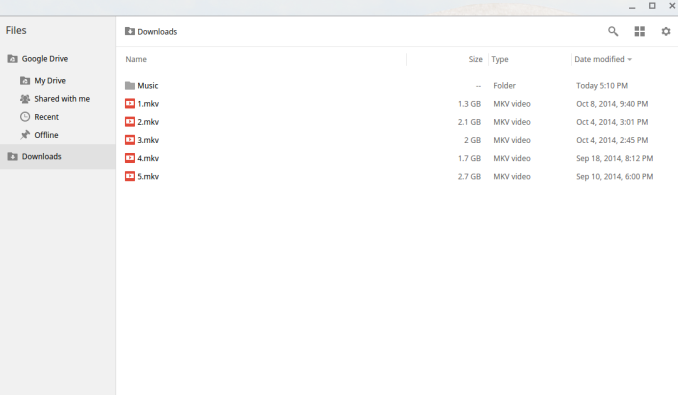Upgrading the SSD in Chromebook & MyDigitalSSD Super Boot Drive M.2 2242 SSD Review
by Kristian Vättö on October 21, 2014 8:00 AM ESTManaging Storage in Chrome OS
Chrome OS behaves a lot like iOS and Android when it comes to file management. While other computer-level operating systems like Windows and OS X give the user full access to system files, Chrome OS only provides very basic file management options.
The user access is limited to 'Google Drive' and 'Downloads' folders, and out of these two Downloads is the only truly local folder since Google Drive relies on cloud storage (although it does have offline functionality too). There is no way to create additional folders (or at least I could not find a way), so if you want to store something locally, it must be stored in the Downloads folder.
The 16GB SSD has about 9.7GB left with the operating system installed, so there is certainly not much room for offline storage in the default configuration. With the 256GB SSD installed, the free space increases to about 204GB, although I am not sure where the remaining ~46GB has gone.
Fortunately, it is possible to create folders inside the Downloads folder, so you can at least have some level of organization for local files. Chrome OS has integrated audio and video playback software (even MKV files are supported!) that can be used to play back local files, but especially the audio player is very limited and does not have support for playlists or other more sophisticated features. It works, but the user experience is much better if you have an Internet connection and use Google's web-based Play Music.
Anyway, there is not much to say about Chrome OS' file management. It is very limited and not user friendly for someone who is used to using Windows or OS X, but if you can work around the limitations it can be usable even with a larger internal drive. As far as performance testing under Chrome OS, there isn't much to be done; the MyDigitalSSD Super Boot Drive feels a bit faster on some tasks, but Chrome OS doesn't tend to hit storage much so the performance benefits aren't the primary reason to upgrade. But let's look at performance with the original and upgrade SSDs using our standard storage tests.












67 Comments
View All Comments
abianand - Thursday, October 23, 2014 - link
Thank you...very stupid of me posing a question without reading the article fully. First time I've done that.Spending around 75-80 for an ssd upgrade negatively affects the value proposition of the chromebook, which in the first place is questionable (to my purpose)
AnnonymousCoward - Thursday, October 23, 2014 - link
5 pages talk about performance, yet there's no inkling on actual user performance. You say "the performance difference is tremendous" - back that up with boot time or app launch time! Just looking at synthetics is idiotic.Realtime power consumption is less meaningful than total power consumed for some task. Faster transfer rates use more power while it's transferring but operate for less time.
cutterjohn - Saturday, November 1, 2014 - link
Also remember AMD is AWFUL wrt power usage.I recently bought a C720/i3/4GB version and replaced the shipped SSD w/128GB my digital -> ~100GB available. I suspect that part of the SSD space is walled of for OS reasons as there is a factory restore(in Android parlance) option which means a clean copy is stored somewhere, probably on it's own partition, and part of the space is probably also saved as misc space(I forget what they call it for SSDs, spare?).
Anyways ATM I've also croutonized it w/ xfce/Ubuntu 14.04, there's also croagh which supports more distros, e.g. ARCH, and chrubuntu which just replaces chrome os IIRC(wasn't ready to do that and probably won't*.)
* I used chrome os exclusively for a few days(waiting for SSD delivery) and it was quite fast and power efficient, regularly giving me ~8h of runtime. It was able to play netflix & amazon instant video OOB, but I haven't tried again since dev moding it and croutonizing it. (I've seen comments that dev mode removes netflix streaming capability, but they were old.)
Even with chroot Ubuntu/xfce it's pretty quick. A fair number of steam games are available for it, and I've just recently installed wine, but have not gotten around to trying out and windows apps/games yet although there are some videos of even skyrim(low settings although the videographer claims medium does OK as well) running on a celery chromebook.
Personally, I'd like an even smaller chromebook, more in the original netbook form factor, in which case 1280x720 or the existing 1366x768 would be quite dense although cramping the keyboard. I mainly picked it up for size and batt runtime as even my Sager 7330 is a bit bulky at times(13") and batt runtime is usually only ~3h. I also wouldn't have minded an i5 option as well and slotted RAM...
omegajimes - Tuesday, November 4, 2014 - link
Do people actually use Chromebooks with ChromeOS? I thought the only reason to pick these up were to load lightweight linux distros like Mint or Elementary on them.leoku - Wednesday, November 5, 2014 - link
I think the Commodore C64 all-in-one in the great grandpa's era is more fun than these netbooks and chromebooks, plus you can program it right out of the box. A Commodore C64 is more expensive than Chromebook nowadays, though.leoku - Wednesday, November 5, 2014 - link
Given the fact, I think the SSD upgrade for a Chromebook is a waste of money.dareo - Sunday, November 30, 2014 - link
I’ve just ordered a Lenovo S540 and it comes with a 1 TB HDD (5400 rpm) + a 16 GB M.2 SSD for caching. This leads to several questions related to the MyDigitalSSD 128GB Super Boot Drive:1. Could I swap out the 16 GB M.2 that comes with the Lenovo, replace it with the MyDigitalSSD 128GB Super Boot Drive, install the OS and apps on it and use it as the primary boot drive?
2. What’s the difference between the MyDigitalSSD 128GB Super Boot Drive and the MyDigitalSSD SC2 Super Cache 2 42mm SATA III 6G M.2 NGFF M2 SSD Solid State Drive?
3. How reliable is this M.2 SSD in comparison to a Crucial MX100 or a Samsung EVO?
4. Would it just make more sense to pluck the M.2 and HHD from the computer and install a 500 GB Crucial MX100 or a Samsung EVO?
Thanks in advance for any feedback / advice on this.